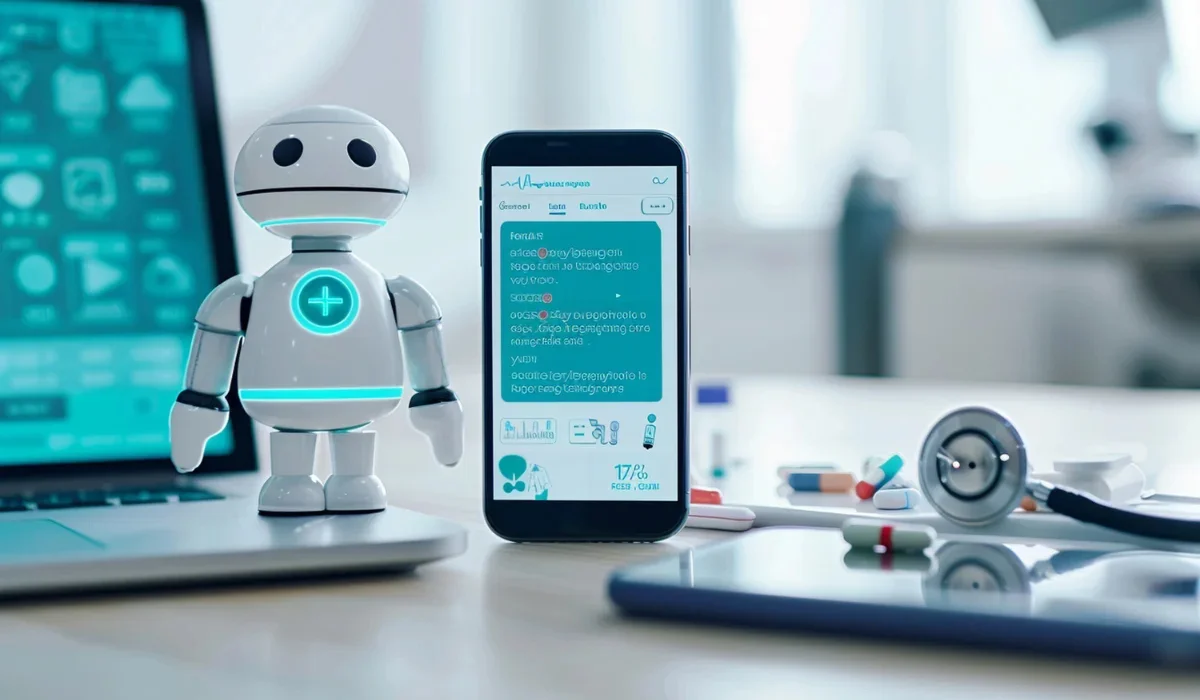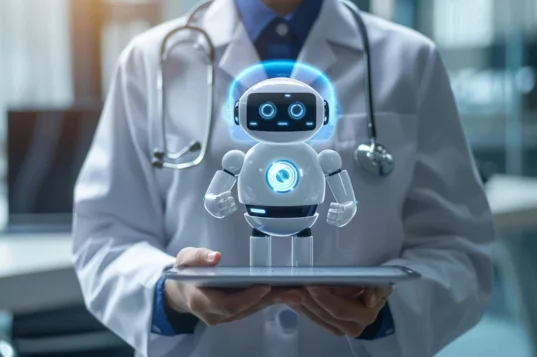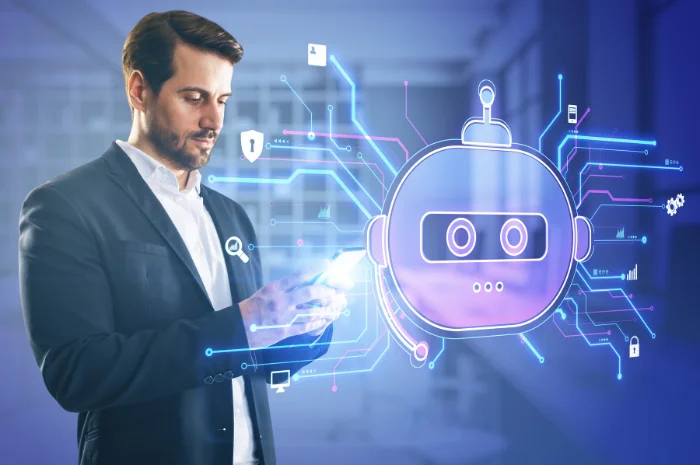Just like one bad experience can push a customer away from the business, poor patient experience can also negatively hurt the hospital’s reputation. However, the growing workload and patient volume are shifting their focus from prioritizing patient experience and providing quality care. AI healthcare chatbots can redefine this experience and minimize the multiple interventions between patients and the true care they need.
They are not options; they are a necessity for the healthcare industry. How? Read the blog to learn why chatbots are important and the 7 areas where they improve patient experience.
What are Healthcare Chatbots?
Chatbots are not physical robots, typically known as humanoids; instead, they are software applications. These bots can be placed on every digital channel, from hospital websites to healthcare applications. Unlike traditional bots, which answer based on pre-installed instructions, AI bots can better comprehend user queries. Thanks to AI technologies like NLP and machine learning, they can write, speak, and understand human languages as we do.
These technologies train bots on different data to comprehend the user’s message through words or voice. They can hear and talk with the users in English, Spanish, or any native language they speak. However, most bots are trained in English, so professional AI experts must train them in a new language.
Any chatbot or voicebot trained on healthcare-specific data, such as disease symptoms, medical records, or other data, is known as a healthcare chatbot.
Why is an AI Chatbot Important in Healthcare?
There are several AI solutions for healthcare but why chatbots are a must is important to know. A large urban healthcare institution has over 500 beds, 1000 staff members, and 50+ departments. Imagine if the patient volume suddenly grows as happened during covid-19. Assisting every patient and giving them needed care and treatment will become a challenge. Those with urgent care and assistance might be skipped.
What if the hospital staff is not enough to take care of each patient and answer their queries? Scheduling appointments for new patients and managing prescription fills—such administrative tasks will create additional burdens for the staff. All these challenges will frustrate the patients, impacting their experience with your hospital.
Besides these challenges, the growing use of chatbots in other industries makes patients more reliant on chatbots. More than half of the patients want to interact with bots to get their healthcare data quickly or any assistance with booking. Healthcare providers should consider these reasons and start using a patient engagement chatbot.
7 Ways to Use Healthcare Chatbots for Patient Engagement

1. Book Appointments
Your front desk staff is always engaged with patients’ calls. It’s almost impossible for them to be available day and night to solve patients’ queries. An AI chatbot can deal with patients, especially those calling outside working hours or during emergencies. It helps them book appointments from their mobile devices at any time of the day.
Unlike human staff, who can book one appointment at a time after checking a patient’s details and matching a doctor’s availability, AI can handle multiple appointments simultaneously. This will take less time than usual while keeping the interaction personal and safe. Patients will be under the impression that a human staff member is on the other side of the line.
2. Help in Finding Nearby Hospitals or Clinics
Patients often have trouble finding the right hospital. An AI chatbot can help by giving them important information about nearby clinics, pharmacies, healthcare centers, and hospitals.
Based on symptoms, it can even suggest which specialists they should consult. From operating time, contact information, registration fees, treatment plans, and user reviews, AI can help patients make informed decisions before receiving services.
3. Remind Patients for Prescription Refills
Elderly patients or patients with Alzheimer’s easily forget to take their medication. Home nurses, caretakers, or family members must remind them to take medicines on time. Even they can forget to remind their loved ones about medications due to their busy lifestyle and schedule.
AI chatbots can free them up and remind patients about dosage without skipping even a single time. It can also personalize reminders and answer their questions on dosage or follow-up appointments. They can even connect patients with doctors if they experience any side effects from drugs without physically visiting the clinics.
4. Educate on Disease and Diet
Patients who are advised to follow a certain diet can consult with AI chatbots instead of a nutritionist every time. They can learn how a diet impacts their health and ask what they should eat or skip for targeted health goals.
However, such AI patient engagement chatbots should be trained with correct and accurate information to avoid misleading answers. AI bot development companies can develop bots for specific tasks and improve the responses with prompt engineering and fine-tuning techniques.
5. Prepare Patients for Diagnosis
Patient engagement chatbots can prepare patients for diagnosis through videos, images, and instructions. This will save patients time on diagnosis and staff time answering common queries like when to start fasting.
6. Connect with Doctors
Chatbots can improve patient-doctor interaction through virtual calls and messages. They can set up calls directly to the respective professionals by analyzing patients’ symptoms or in case they can no longer assist patients.
7. Help in Insurance Claims
Complex healthcare insurance stresses patients, especially when they need it urgently. Using an AI chatbot, patients can understand the claims in simple language or file them. They can get details such as what the insurance covers or how to use the benefits. It can also guide patients through the claim process or remind them about renewals or premiums.
Future of Chatbots in Healthcare
AI healthcare chatbots will never fade out. They will become more personalized and advance in the future. They will further minimize the gaps between patients and doctors. The advanced bots can record and measure patients’ symptoms virtually. Integrating with IoT and wearable devices will make this possible. However, hallucinations in AI bots can restrict future possibilities. Therefore, it is important to train the bots on precise information. Training them to protect patients’ data and comply with regulations will be another aspect where AI chatbot development companies should focus on improving patient experience.
Conclusion
AI chatbot in healthcare reduces the frustration among patients and help them get timely assistance whenever they need it. By incorporating them into the hospital’s websites, healthcare applications, and fitness apps, healthcare providers can create a patient-centric environment. As we look into the future, the role of AI chatbots will increase more than just as an assistance.



